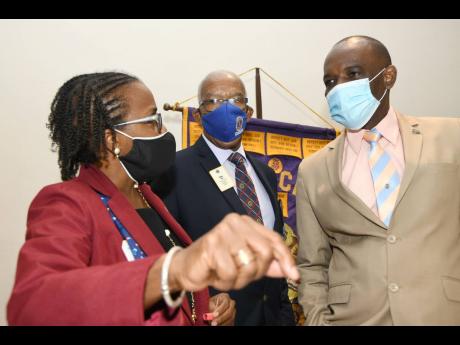Scrap elitist PEP system, urges JTA president - Gabriel wants zoning or random high-school placements
Jamaica Teachers’ Association (JTA) President Jasford Gabriel is appealing to the Government to make adjustments to the performance-based placement system for students leaving primary schools for secondary studies, calling for a zoning system or a random distribution of students entering high schools.
He said the Primary Exit Profile (PEP) system is not serving the education system well and is already having devastating effects in the COVID-19 era when many students are missing out on lessons due to Internet connectivity issues and resource challenges.
“The Government must actively engage stakeholders and begin to treat with the age-old, elitist approach to placement at the secondary-school level. This is resulting in widespread stigmatisation, self-esteem issues and other social issues across the system,” Gabriel said yesterday while addressing a Lions Club of Kingston meeting at The Jamaica Pegasus.
He explained that based on the PEP system, there could be schools where the placement scores begin at zero and go up to 20 per cent.
“Even if by some miraculous means they are able to add five per cent value, at the end of five years, we are still graduating hundreds that may not pass a single subject. At the higher end, we have students who are placed in schools with 90 to 100 per cent, and without even adding any value, they are coming out with distinctions,” he asserted.
Gabriel, the principal of Manchester High School, pointed out that students’ placement often affects the willingness of parents to invest in the education of children placed at non-traditional schools, which account for 80 of the island’s 170 secondary institutions.
He reported that since Monday, traditional high schools have been accounting for upwards of 80 per cent of their students in online classes.
He also said that traditional high schools are able to forge stronger partnerships through alumni associations because they would have graduated students who are excelling on the national and international scene and who are positioned to give back.
“We believe that with the level of dexterity, influence, and creativity that our school administrators and teachers have and the kind of work that we see our teachers doing in these non-traditional schools, if students were to be placed randomly or based on zoning, ... our education system would be much further advanced,” he said.
A zoning system would see students attending secondary schools within a particular geographic region, usually within the proximity of their residence.
Gabriel said this move would require the ministry to ensure that all schools are properly resourced.
“Whatever we do, though, I don’t believe that this elitist approach that we have to education can continue, and we are seeing the devastating effects of that now. Those who were further ahead are moving even further ahead, and those who were behind are falling further behind,” he said.
The JTA president also said that given the greater use of technology in classrooms currently due to the COVID-19 pandemic, there must be a review of the training that educators in service and pre-service receive.
“We have to look at the technology courses that are offered in the teachers’ colleges to make sure that they are more aligned with the requirements of the 21st century. Teachers should be able to manipulate the different learning-management systems in a way that will make learning exciting and will encourage students to want to be at classes online,” he said.
Gabriel also called for more literacy specialists, special education teachers, and social workers to be deployed in the education sector to assist intellectually challenged students.
“The ministry has been very supportive in this regard, ... [but]the need is even greater now that we have to treat with these students online,” he said.

